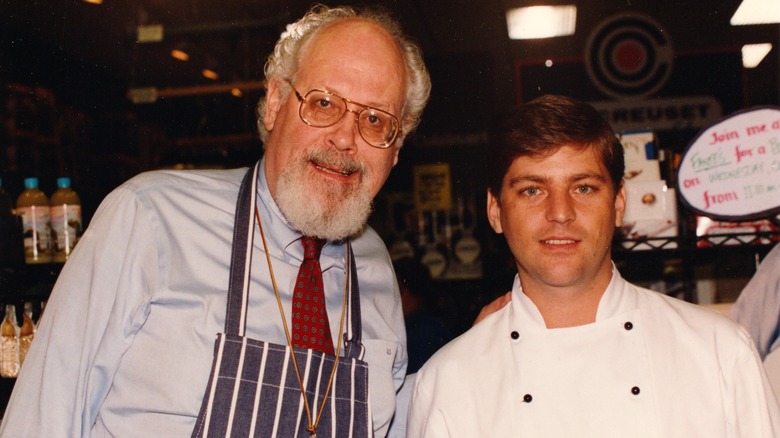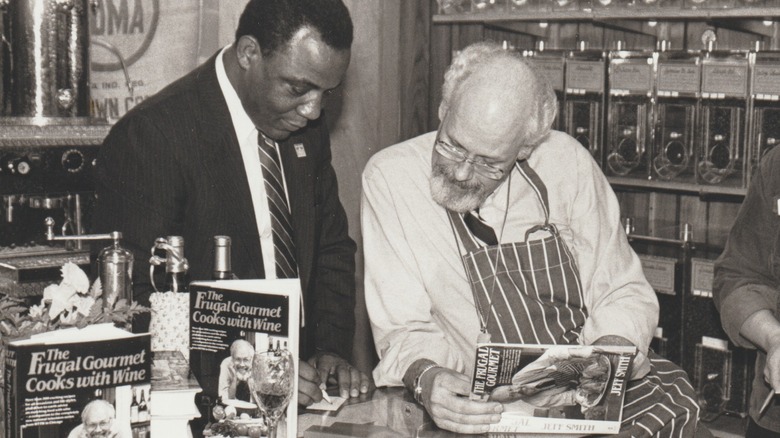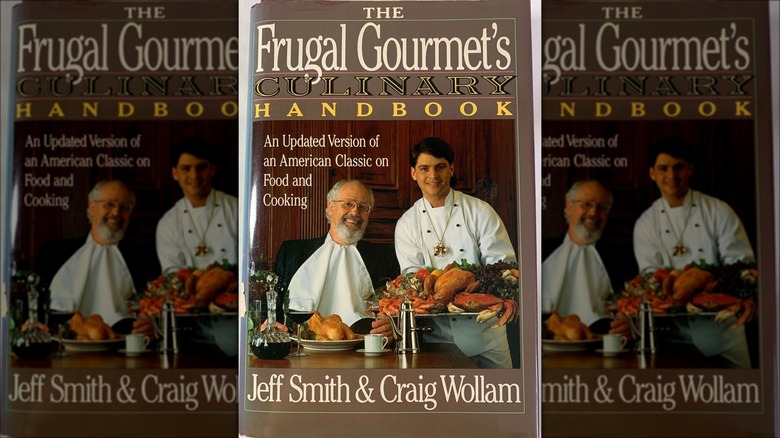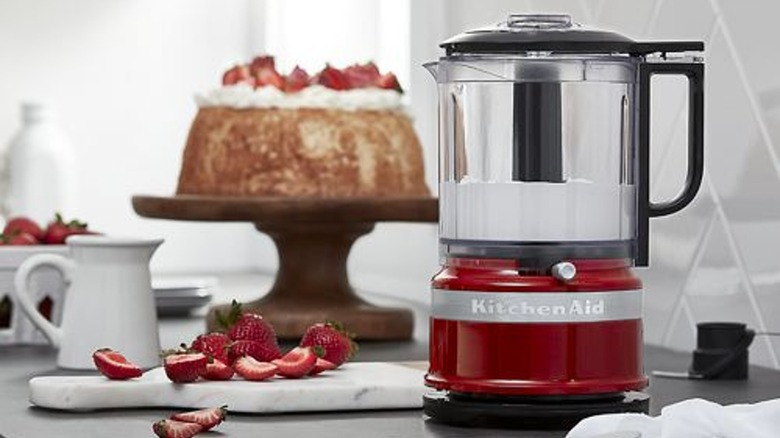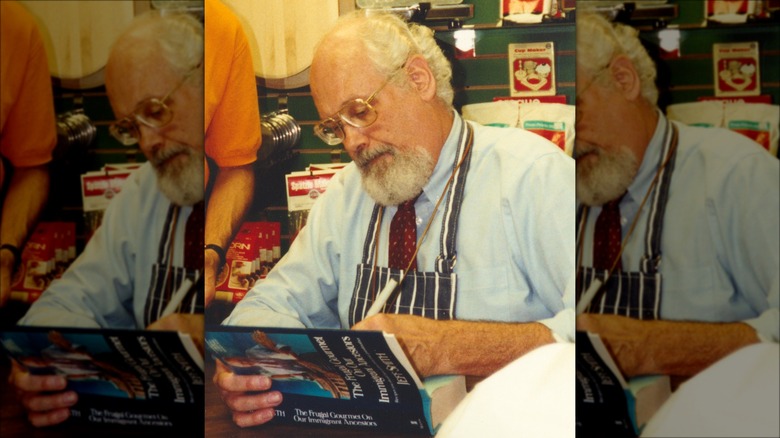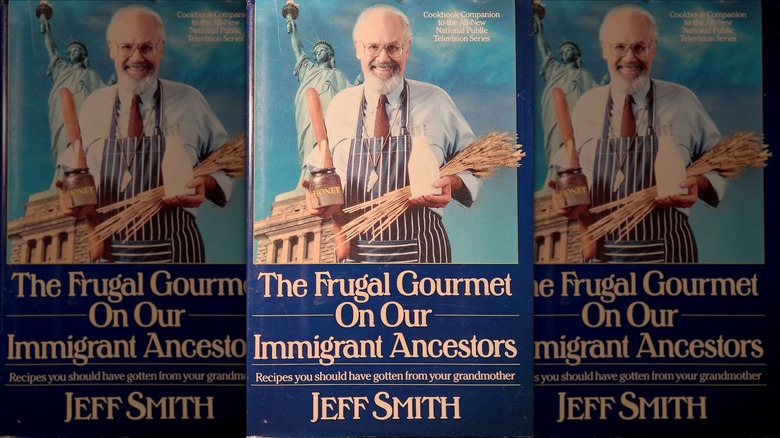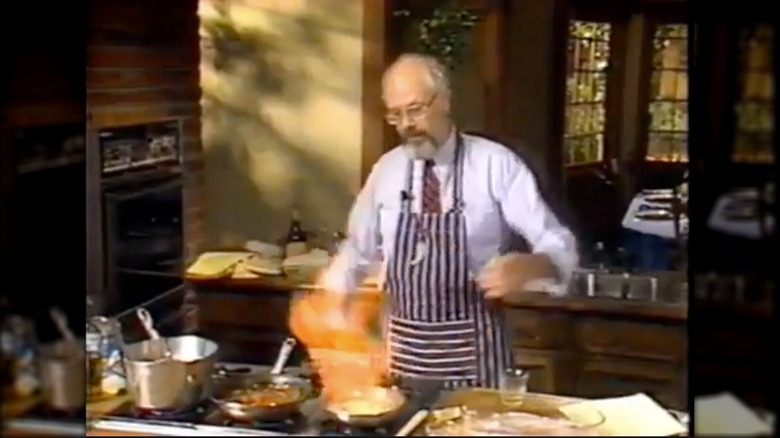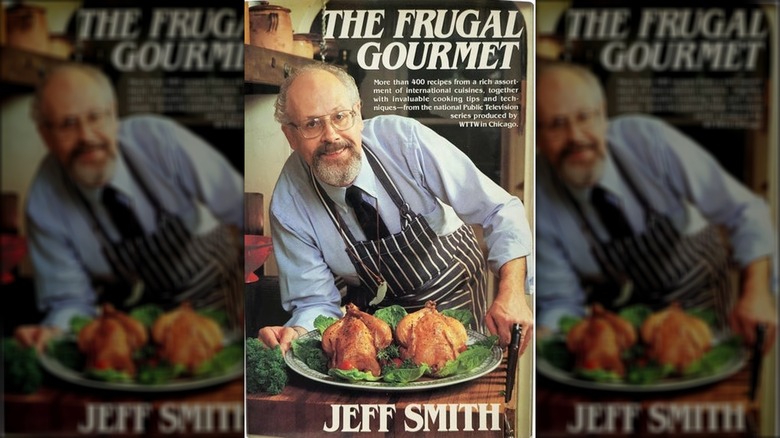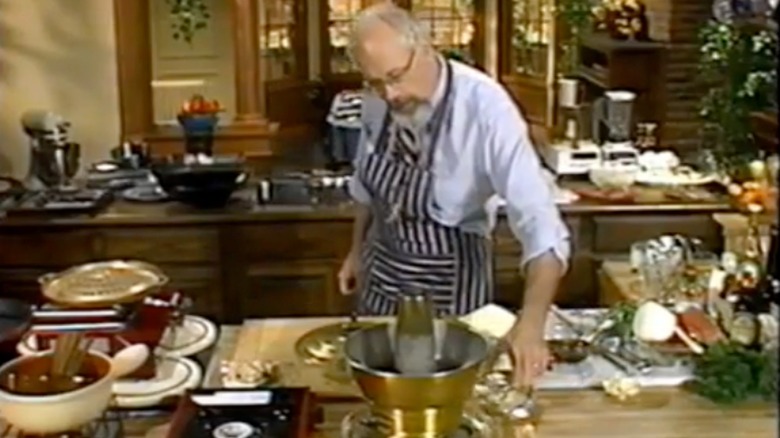What Really Happened Behind The Scenes Of The Frugal Gourmet's Kitchen
We may receive a commission on purchases made from links.
Even if you were a huge fan of "The Frugal Gourmet" back in the 1980s and 1990s, there are probably still many behind-the-scenes details that you might not know. At one point, 300 public television stations carried "The Frugal Gourmet." At its most popular, 15 million viewers at a time were watching it. Then it just disappeared. Before "The Frugal Gourmet's" downfall, Smith had sold 12 million of his companion cookbooks to his TV series, with the last one coming out in 1995 (two years before the TV show ended). The show had its share of successes, but there were also some problems brewing beneath the surface.
Over the years, Smith came under scrutiny for everything from not being frugal enough and plagiarizing to being politically incorrect and selling out for money. He tended to have excuses for everything and said people criticized him because they were jealous of his success. However, he became an instant has-been once his past finally caught up to him in a big way. If you ever wonder what happened to "The Frugal Gourmet" and have some of Smith's cookbooks in your kitchen, you'll likely develop different feelings about the show and him once you read about what was happening behind the scenes.
He was getting lambasted for stealing recipes
The press started insinuating that Jeff Smith didn't write most of his own recipes for the "The Frugal Gourmet" TV shows and cookbooks and that he had stolen them from others. This possibility didn't sit well with others putting out TV cooking shows and writing cookbooks.
The show had eight seasons, with 216 episodes and specials. Plus, Smith put out over a dozen Frugal-Gourmet-branded cookbooks with recipes corresponding to episodes from the show. We counted over 300 recipes in one of his early cookbooks, so he shared thousands of recipes with his fans. Clearly, nobody can come up with that many unique recipes, especially with so many being international. However, the problem was that he was passing others' recipes as his own and making money off of them. He wasn't even bothering to change most of them with his own spin.
When confronted with the fact that many of his recipes were practically word-for-word copies of recipes in other cookbooks, he didn't deny it. He told Newsday, "Sure, I mooch off other cooks; every good teacher is a thief. But I always try to give credit when I do" (via Seattle Times). However, if he had actually given credit to all the interviewees who had given him recipes, readers who had sent him recipes, and cookbooks he'd consulted, nobody would have been accusing him of theft.
He had to hire a professional chef
Not only was Jeff Smith stealing other cooks' recipes, but "The Frugal Gourmet" gained a reputation for having recipes that didn't quite work. In addition to Smith's recipes often being buggy, he was flat-out providing people with misinformation that didn't have good research behind it. Thus, the show eventually ended up hiring a chef to pick up the slack.
In response to his foibles, Smith told Newsday, "I never claimed to have chef's training; I'm a good cook, but I'm not a chef. But I bet I've done more study of history than they have. And I bet they wish they sold as many books as I do. Jealousy is not a kind bedfellow" (via Seattle Times).
The chef that the show hired in 1986 to be Smith's assistant was Craig Wollam. Wollam joined in the show's fourth year. Once he started collaborating with Smith, the recipes on the show were less of a hit-or-miss affair. In addition to helping Smith with the show, Wollom co-authored two cookbooks with him: "The Frugal Gourmet Whole Family Cookbook" and "The Frugal Gourmet's Culinary Handbook." In fact, the "Culinary Handbook" was nearly all Wollam's work. It was based on a 1904 cookbook, and Wollam did pretty much all the adaptation to turn it into a Frugal Gourmet cookbook. However, Smith's name is still on it.
His integrity was under scrutiny for paid promotions
Some of the viewers watching "The Frugal Gourmet" on public television in the '80s and '90s scrutinized the fact that Jeff Smith was promoting products for pay. Today, most of us wouldn't be fazed by a TV cooking show celebrity doing product promotion. After all, it's the age of paid influencers, and many of today's cooking celebs even have their own product lines.
Smith wasn't getting paid to promote everything on his show, but it was enough to be off-putting to some. Smith would often name-drop. He had his favorite brands like Henckels knives, Le Creuset Dutch ovens, or Silver-Stone-lined frying pans. However, some of the brands that he name-dropped paid him to do so. Knowing that he was getting paid to promote some brands cheapened his recommendations for some. Was he suggesting KitchenAid because it truly made a good product or because the company was paying him to promote its food processor? In 1987, you could even find a magazine ad for KitchenAid food processors that promised a discounted version of a "Cooking With The Frugal Gourmet" video with purchase. Another company that used "The Frugal Gourmet" in their advertisements was Columbia Crest wine.
Some people who opened "The Frugal Gourmet Whole Family Cookbook" and other cookbooks saw the nearly 100-page introduction and thought it looked like one big commercial for products he likes and some that he's promoting. However, his level of paid product promotion is tame for today.
He could be irritable
While his on-screen persona was mainly lighthearted and fun-loving, there was another side to Jeff Smith. Those who knew and worked with him regularly saw different sides of him than the camera saw on "The Frugal Gourmet."
Smith bossed his assistant, Chef Craig Wollam, around on screen, and some fans have wondered how that translated off-screen. What you heard about Smith depended on who you asked. A chef who helped him for a single season found him friendly and easy to get along with. Another friend who once appeared on his show found him supportive. However, if you asked his film crew, they'd tell you he was easily irritated. Others just found him plain condescending.
Smith admitted to sometimes letting his emotions run high. He explained his susceptibility to being cranky by saying, "My emotions are always on the surface, and I'm not embarrassed by that. I think it's the only way I can prevent ulcers" (per Seattle Times).
He was accused of ethnic stereotyping
Many of "The Frugal Gourmet's" seasons revolved around ethnic food, which was great for introducing new foods to viewers who had only ever tasted their own regional cuisine. He introduced a whole world of flavor to many home cooks. However, he was perhaps too casual in his approach and not as politically correct as he should have been for someone trying to faithfully represent a culture's food.
Smith was already digging into international cuisine by episode five of the first season, often devoting entire episodes to just one nationality's cuisine. Season 5 gave him the recipes he used to write his cookbook "The Frugal Gourmet Cooks Three Ancient Cuisines: China, Greece, and Rome." And he shared recipes that appear in "The Frugal Gourmet: On Our Immigrant Ancestors" in Season 6 and Season 7.
When asked about the perception some had of him making ethnic stereotypes, he denied it. He told Newsday (archived by the Seattle Times), "If I was, I'd hear about it from the communities I write about. If I make jokes, it's because I'm having fun and because I feel that I'm part of their culture." His mother was from Norway, so he said, "I'm the first to make fun of Norwegian food," remarking about how white a lot of it can be. While you can make fun of your own food, it's something completely different to make fun of another culture's food — even in jest.
He liked to shoot episodes without redos
One thing you might not have realized about episodes of "The Frugal Gourmet" is that Smith insisted on powering through an episode no matter what happened. If he made a little mistake, he wanted it to be a part of the show. So, there usually weren't lots of takes for his show or redos of things that didn't work out like he'd planned like other cooking shows tended to have.
When you watch an episode of "The Frugal Gourmet," the experience feels more realistic than with many other television cooks. There are pans, food, and ingredients everywhere, like in a real kitchen. Everything's happening all at once, and Jeff Smith often says whatever comes to mind organically in the moment. He told Newsday (archived by the Seattle Times) that his goal was to make the show "feel as live as possible." He said, "If I make a mistake, I just say, 'Oh, my God, look what I did.'"
His lack of self-consciousness and realness was one of the attributes that drew in watchers all those years. As you can see in YouTube clips, he'd yell things to himself like, "Jeffery, stop using your apron as your towel." Sometimes, he'd bring out a dish only to realize it wasn't the one he'd planned to show the audience, but he'd keep it in the show anyway and just move on.
People complained that the Frugal Gourmet was neither frugal nor gourmet
There was some confusion about what "The Frugal Gourmet" was all about. The show's name made many viewers assume he would show them how to make gourmet-level meals cheaply. However, Jeff Smith's definitions of "frugal" and "gourmet" were quite different. Many times in his shows, cookbooks, and interviews, he'd have to go to bat for himself with the definition he presents in his cookbooks. In the introduction to "The Frugal Gourmet" cookbook, he explains it succinctly. He says that rather than "frugal," meaning "cheap," it means that you use everything and are careful with your time as well as with your food products. Thus, using fresh foods carefully would result in spending less money. He explains that he uses "gourmet" to mean a "lover of good food and wine" rather than some sort of "food snob" (via Scribd).
Smith complained to the Associated Press, "People criticize me for enjoying good food when I use the word frugal" (via the LA Times). When they saw the name of the show, some people got the idea of a penny-pinching miser eating sub-par food. While some of the recipes he shared were inexpensive and fancier, that wasn't the main idea. The show wasn't about things like how to spend only $12 to make chicken cordon bleu. Instead, it was a cooking show that appealed to the middle class and offered a gateway to good food without being too pretentious.
The kitchen was filled with expensive equipment
Speaking of not being thrifty, "The Frugal Gourmet's" kitchen was nowhere near frugal. The kitchen set's 1983 rebuild was estimated to have cost about $12,500. Adjusted for inflation, that's nearly $38,500 in today's money. Plus, it was filled with all kinds of kitchen gadgetry that made it worth far more. Much of the equipment was industrial-level so that it didn't break down from intensive use. So, it costs more than you might have thought from an initial glance.
Jeff Smith had a very exacting idea of all the equipment he needed for "The Frugal Gourmet." You can get an idea of how important the equipment was to him by perusing the introductory section to his cookbooks, which only got longer and full of more equipment as the years progressed. He had a multitude of knives, favoring Henckels and Sabatiers. He liked Silver-Stone-lined pots and pans, enameled cast iron Le Creuset Dutch ovens, and Corningware. He had all sorts of food machines, including a Kitchenaid food processor. Then, there were all kinds of specialized gadgets, from garlic presses to special equipment for international food. He certainly didn't skimp on buying special equipment for international cooking endeavors. For example, in his dim sum episode, he has stacks and stacks of Chinese bamboo steamer baskets.
Whether the home viewer had access to all this equipment wasn't really important. He just liked to show what was possible. However, all his gadgets certainly inspired some kitchen wishlists.
Sexual abuse allegations pushed him off the air
"The Frugal Gourmet" ended in 1997 after allegations that Jeff Smith had sexually molested around 20 teen boys and young men, reports Current.org. Most happened in the 1970s when Smith (then a Methodist minister) employed several teen boys at a deli and catering service in Tacoma, Washington, called The Chaplain's Pantry. Another claimed Smith sexually abused him after picking him up as a hitchhiker in 1992. Sources vary about whether the hitchhiker was a teen or an adult, according to the Washington Post. Most of his accusers mentioned alcohol, secrecy, and a grooming process at the hands of someone they had trusted. When reporters started digging around, they found that there had been rumors around Tacoma about Smith for years.
The first to speak out publicly was Clint Smith, who started talking to reporters in 1993 and finally got a spot on a local radio show to accuse Jeff Smith of pedophilia in 1995. Clint claimed that Jeff had started paying him a settlement to keep quiet back in 1991 but stopped paying. Everything snowballed after the radio show, with another of Smith's alleged victims hearing the broadcast and coming forward. By 1997, there were two separate lawsuits.
While Smith maintained his innocence, he settled with seven of the men who sued him rather than go to trial in 1998. Smith initially wanted to continue "The Frugal Gourmet" franchise, but he apparently never found an underwriter willing to take him on after all the controversy.
The end of The Frugal Gourmet caused legal problems for his chef
Even though Jeff Smith's legal situation had no connection to his chef, Craig Wollam, Wollam found himself with his own legal troubles. When "The Frugal Gourmet" ended, Wollam found himself in court trying to adjust his child support situation. He had originally been paying $2,000 per month to support his three-year-old son, but he petitioned to change it to $352 per month since his income had significantly decreased because he was laid off from the show.
Even though "The Frugal Gourmet" had well and truly ended, Wollom had difficulty convincing the court that he wasn't voluntarily unemployed or voluntarily underemployed. His son's mom tried to show evidence that Wollom was still getting money from "The Frugal Gourmet" and still had enough income to keep paying.
Things dragged on for years, with documents not being filed on time, lost files, and incurred court fees. Wollam's lawyer was even almost disbarred for failing to pay money to the court related to the case.
